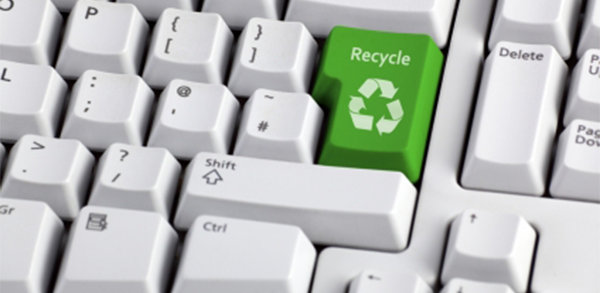
By Veena Clay March 5, 2015
Hoarding electronics may not be everyone’s bad habit, but its prevalence in households and offices across the country cannot be denied. With desktops, it happens with particular frequency, often because we just don’t know what to do with an old computer.
Most states employ landfill bans to prevent residents from ditching their old desktops in the trash, and rightly so. The amount of toxic material that can seep out of an improperly discarded desktop can threaten groundwater quality as well as the health and nutrient content of soil, which can eventually negatively impact human health.
However, when residents don’t have the option of leaving a desktop at the neighborhood dumpster, what can they do with these electronics? Certain retailers and nonprofits may be the best places for desktop collection. For example, Best Buy and Staples are two of the most well-known retail electronics collectors by working in partnership with a responsible recycler to ensure desktop computers and other electronics are sustainably and responsibly recycled.
Goodwill, too, is a great place to take an out-of-date desktop. Through its partnership with ERI, all Sacramento, CA, Goodwill sites accept working and non-working desktop computers – even those old clunky ones from years past. In fact, the need for recycling computer desktop models is extremely high, as they can contain materials no longer in use today as a result of their high level of toxicity and potential to harm the environment if improperly discarded.
But there are more reasons beyond toxicity to make recycling your desktop a must. However, first, let’s take a closer look at the environmental harm discarded desktops can cause.
Top reasons to recycle your desktop:
1. Toxicity and Environmental Harm
Not enough can be said about the damage improperly discarded electronics can do to the environment. It’s not that electronic devices are so toxic that we should be concerned about keeping them in our homes. It‘s easy to get the issue confused in that way. Rather, the danger lies in improper disposal.
This can mean a device is erroneously tossed in the garbage, left on the curb or illegally dumped in other areas. It can also result in devices being illegally shipped to underdeveloped countries, where the risk of improper handling and unsafe recycling is high. In fact, this latter method of dealing with e-waste streams is coming under increasing fire here in the U.S.
The environmental threat of illegal dumping, whether in the US or elsewhere, stems from the toxic materials used to make electronic devices. Electronics contain a number of hazardous components such as arsenic, mercury, lead and cadmium, which can damage and pollute water, soil and air as well as negatively impact the health of surrounding communities.
2. Conserving Resources
Many of the components that make up electronics are sourced from precious metals, and often dwindling, natural resources. When desktops are recycled, less of these resources are needed, and more can be conserved over time.
Current production rates for desktops may have slowed a bit due to the advent of laptops and mobile technology, but they are no less likely to be huge drains on natural resources in their manufacturing. Additionally, recycling these devices can reduce the amount of surface mining conducted in order to keep pace with production demands. Such mining can be extremely harmful to the environment and damaging to the livelihood of local communities.
3. Privacy Concerns
Recycling your old desktop can also allay privacy concerns. Not all recyclers can guarantee your information can be protected even after your drop it off for collection, but some recyclers have made data security their top priority. This is increasingly crucial in an atmosphere in which hackers and password code hunters have rendered even top corporations defenseless.
Improper disposal of electronic devices offers no guarantees that your bank account information, personal data and even emails will go untouched – even if the device is no longer operable. The best way to ensure private information is safe and secure even after disposal is to send the device to a certified electronics recycler or a local retailer that works in partnership with one.
4. Non-Profit Reuse
Not all recycling must result in shredders ripping through a device until it’s broken down into its most basic parts. Sometimes, all a desktop needs in order to become operable again (and safeguard your information) is a data swipe and a new operating system.
The ease of reuse with old desktops has led to a number of programs making computers available to at-risk youth, low-income communities and schools across the nation. Nothing beats the feeling of knowing that your old device is being put to good use in a community that needs it, rather than languishing in a landfill causing irreversible environmental harm.
Old Desktops and Better ChoicesWhen it comes to old desktop computers, we have a number of choices about disposal and discarding. Often, a great number of older models end up sitting in garages gathering dust or littering the vacant lots of communities and curbsides. These methods of disposal are increasingly old hat and obviously not the most sustainable methods of dealing with e-waste.
Instead, consider recycling your old desktop. It’s a great way to clear space for the new upgrade, and it has a number of possibilities for improving conditions here on the home planet. In fact, the possibilities can be endless if everyone will finally get the message: You should definitely recycle your old desktop, and you can.